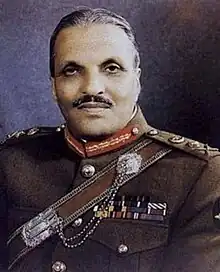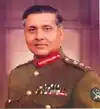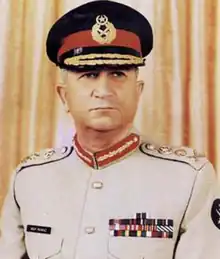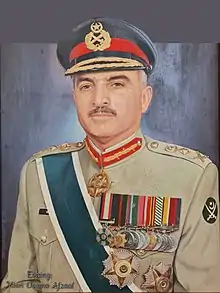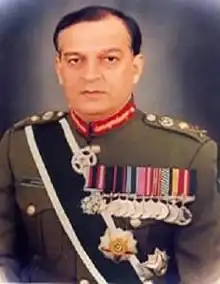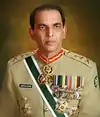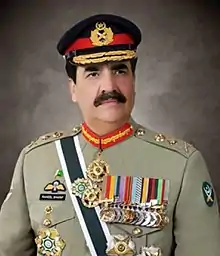| Chief of the Army Staff | |
|---|---|
| سالارِ افواجِ پاکستان | |
.svg.png.webp) Flag of the Chief of the Army Staff of Pakistan | |
| Ministry of Defence Army Secretariat-I at MoD[1] | |
| Abbreviation | COAS |
| Member of | Joint Chiefs of Staff Committee National Security Council Special Investment Facilitation Council |
| Reports to | Prime Minister Minister of Defence |
| Seat | General Headquarters (GHQ) Rawalpindi Cantonment, Punjab |
| Appointer | Prime Minister of Pakistan |
| Term length | 03 years renewable once subject to approval of Prime Minister |
| Precursor | Commander-in-Chief of the Army |
| Formation | 3 March 1972 |
| First holder | General Tikka Khan |
| Succession | On basis of seniority, subjected to the decision of the Prime Minister of Pakistan. |
| Unofficial names | Army Chief |
| Deputy | Vice Chief of the Army Staff (Vacant) Chief of the General Staff |
| Salary | According to Pakistan Military officer's Pay Grade (apex Scale) |
| Website | Official website |
The Chief of the Army Staff (COAS) is a statutory position in the Pakistani Army held by a general officer. As the highest-ranking officer, it is one of the most powerful positions in Pakistan Army.[2][3]
This is the senior most appointment in the Pakistan Army who is a member of the Joint Chiefs of Staff Committee in a separate capacity, usually consulting with the Chairman joint chiefs to act as a military adviser to the Prime Minister and its civilian government in the line of defending the land borders of the country.[4] The Chief of Army Staff exercises responsibility of command and control of the operational, combatant, logistics, and training commands within the army.[4]
The appointment, in principle, is constitutionally subjected to be for three years but an extension may be granted after the approval by the President on the recommendations of the Prime Minister.[5] The Chief of Army Staff is based in the GHQ, and the current Chief of Army Staff is General Syed Asim Munir, serving in this capacity since 29 November 2022.[6][7]
Office of the Chief of the Army Staff
The designation of the Chief of the Army Staff was created from the previous title Commander-in-Chief of the Pakistan Army in 1972. Since 1972, there have been 10 four-star rank army generals to be appointed as chief of army staff by statute.[8] The Prime Minister approved the nomination and appointment of the Chief of Army Staff, with President confirming the Prime Minister's appointed choosing and nomination.[9]
The army leadership is based in the GHQ whose functions are supervised by the Chief of Army Staff, assisted by the civilians from the Army Secretariat of the Ministry of Defence (MoD).[1] The Chief of Army Staff exercise responsibility of complete operational, training and logistics commands.: 131 [10]
There are several principle staff officers (PSO) who assist in running the operations of the Army GHQ:
- Engineer-in-Chief (E-in-C)
- Chief of General Staff
- Chief of Logistics Staff
- Inspector-General of Training and Evaluation (IGT&E)
- Inspector-General Communications and IT (IGC&IT)
- Inspector-General Arms (IG Arms)
- Military Secretary (Mil Secy)
- Adjutant-General
- Quartermaster General (QMG)
- Judge Advocate General
- Director-General EME (DGEME)
- Director-General Frontier Works Organisation (DGFWO)
List of chiefs of army staff
| No. | Portrait | Chief of Army Staff | Took office | Left office | Time in office | Unit of Commission |
|---|---|---|---|---|---|---|
| 01 | General Tikka Khan HJ, HQA, SPk (1915–2002) | 3 March 1972 | 1 March 1976 | 3 years, 364 days | 2 Fd Regt Arty | |
| 02 | General Muhammad Zia-ul-Haq (1924–1988) | 1 March 1976 | 17 August 1988 | 12 years, 169 days | 13 Lancers | |
| 03 | General Mirza Aslam Beg NI(M), SBt (born 1931) | 17 August 1988 | 16 August 1991 | 2 years, 364 days | 16 Baloch | |
| 04 | General Asif Nawaz Janjua NI(M), SBt (1937–1993) | 16 August 1991 | 8 January 1993 † | 1 year, 145 days | 5 Punjab | |
| 05 | General Abdul Waheed Kakar NI(M), SBt (born 1937) | 11 January 1993 | 12 January 1996 | 3 years, 1 day | 5 FF | |
| 06 | General Jehangir Karamat NI(M), TBt (born 1941) | 12 January 1996 | 6 October 1998 | 2 years, 267 days | 13 Lancers | |
| 07 | General Pervez Musharraf NI(M), TBt (1943–2023) | 6 October 1998 | 29 November 2007 | 9 years, 53 days | 16 (SP) Medium Regt Arty | |
| 08 | General Ashfaq Pervez Kayani NI(M), HI(C) (born 1952) | 29 November 2007 | 29 November 2013 | 6 years | 5 Baloch | |
| 09 | General Raheel Sharif NI(M), HI(M) (born 1956) | 29 November 2013 | 29 November 2016 | 3 years | 6 FF | |
| 10 | General Qamar Javed Bajwa NI(M), HI(M) (born 1960) | 29 November 2016 | 29 November 2022 | 6 years | 16 Baloch | |
| 11 | General Syed Asim Munir Ahmed Shah NI(M), HI(M) (born 1968) | 29 November 2022 | Incumbent | 1 year, 46 days | 23 FF |
See also
References
- 1 2 MoD, Ministry of Defence. "Organogram of MoD" (PDF). mod.gov.pk/. Ministry of Defence Press. Archived from the original (PDF) on 18 September 2017. Retrieved 22 July 2017.
- ↑ "Pakistan Extends Term For Powerful Army Chief". RFE/RL. Retrieved 27 August 2022.
- ↑ "Lt Gen Raheel appointed as new COAS, Lt Gen Rashad as CJCSC". The News. 27 November 2013. Archived from the original on 1 December 2013. Retrieved 16 December 2013.
- 1 2 Shabbir, Usman (2003). "Command and Structure control of the Pakistan Army". pakdef.org. PakDef Military Consortium. Archived from the original on 7 January 2019. Retrieved 24 July 2017.
- ↑ "Will retire on November 29, Kayani confirms". The Express Tribune. 6 October 2013. Retrieved 16 December 2013.
- ↑ Dawn.com (29 November 2022). "Gen Bajwa to hand over command to Gen Munir today". DAWN.COM. Retrieved 29 November 2022.
- ↑ "Gen Qamar Javed Bajwa to hand over command to Gen Syed Asim Munir shortly". www.geo.tv. Retrieved 29 November 2022.
- ↑ "The Army Chief's". www.pakistanarmy.gov.pk. Retrieved 19 October 2019.
- ↑ Zahra-Malik, Drazen Jorgic and Mehreen (26 November 2016). "Pakistan PM Sharif names General Bajwa as new army chief". Reuters UK. Retrieved 26 November 2016.
- ↑ Pakistan Intelligence, Security Activities and Operations Handbook - Strategic Information and Developments. Lulu.com. 2009. p. 230. ISBN 9781438737225. Retrieved 24 July 2017.
.jpg.webp)

